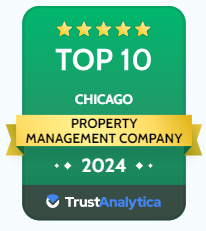There are many excellent reasons to work with a Chicagoland area property management company when you own rental homes in this market. One of the best reasons to hire a professional is that security deposit disputes are frequent and expensive. Tenants have a lot of protection when it comes to their security deposits, starting with the State of Illinois law – The Security Deposit Return Act. Even more complex is the local Chicago law - The Residential Landlord and Tenant Ordinance.
Local real estate laws are very specific about when and how to return the deposit. If you find yourself dealing with a tenant dispute, it could be time consuming and expensive. You’ll want to avoid the courts whenever possible.
Tenants can dispute several things in the way their deposit is collected, held, and returned. MF Cashflow Property Management Team has the experience to make sure that everything is done legally and within compliance of the law.
Here are some of the most important things you need to know:
Holding the Deposit: Paying Interest Every 12 Months
You’re required to hold the deposit in an interest bearing account. You have to pay your tenants the interest that’s earned every 12 months. With the current low interest rates this may add up to only a few dollars. However, you still have to document the interest earned, and you still have to make a payment every 12 months. Don’t hold onto the interest until the tenants move out. If you do, the tenants can file a complaint and the penalties you have to pay will be significantly more than the interest that was even earned.
You also need to notify the tenant which bank the money is being held. They’re entitled to a written receipt when you collect and deposit the funds. You must keep the money in an account separate from your own.
Returning the Security Deposit Within 45 Days
Once your tenant moves out, you have 30 days to return the security deposit or provide a detailed list of why you are keeping the funds. You can only make deductions for unpaid rent and property damage that was caused by the tenant’s abuse, misuse, or neglect of the home. Many landlords get into trouble when they try to deduct for normal wear and tear. You can’t do that, and you need to have documentation that proves the damage caused by the tenants.
As local property management experts know, Chicago security deposit law requires that we document the cost of repairs and provide that documentation to the tenants when deductions are made. You’ll need to provide an itemized statement of damages and the repair costs within 30 days of the tenant moving out. If you miss this deadline or fail to provide the written statement, you cannot deduct any money from the security deposit at all. Be sure to attach paid receipts to the statement you provide your tenants.
If you don’t have paid receipts and can only provide estimates, you’ll have an extra 30 days to provide the paid receipts for the completed work.
Communicating with Your Tenant in Chicago
The best way to deal with disputes is to avoid them. Make sure you follow these laws and requirements carefully so that your tenant has no reason to file a dispute or make a claim. If you do get approached by your tenant disputing what you’re deducting, see if you can come to some kind of compromise. It’s not worth it to go to court over a $100 charge for a stained carpet.
We’ve found that good communication and a positive tenant relationship can often lead to fewer security deposit disputes.
Security deposit disputes in Chicago can be a nightmare for investors and landlords, and that’s why you need the experienced guidance of a professional Chicagoland area property management team. We at MF Cashflow Team do not hold security deposits and use the move-in fee method in Chicago. We’d be happy to provide the expertise you need.
MF Cashflow is a full service property management company serving Chicago and Chicago suburbs. Whether it is apartment management or a single family property, we handle residential property management. We help owners maximize their cash flow so they can see a positive balance sheet at the end of the year.








